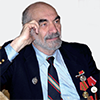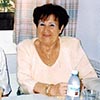The children of the War are persons who today are no less than 75 (for many, alas, one has to add "would have been"). Those among them , who were present in the Fascist occupation are the last witnesses of terrible crimes. Their testimonies you find in all the sections of our site.
 Boris Vladimirovich Srebnik, honored worker of Higher Institute in the Russian Federation, Acting member of the New York Academy of Science, professor of the Financial University. Boris Vladimirovich – a former prisoner-minor in the ghetto of Minsk, where more than 100 thousand people were exterminated. Here, before his eyes, all his relatives died. During October 1943 at the age of 9 years on the day of the shooting of the whole population of the ghetto he succeeded to crawl beneath the fence of barbed wire and together with several boys to get to the 5-th squad of the 2-nd Minsk Partisan Brigade.
Boris Vladimirovich Srebnik, honored worker of Higher Institute in the Russian Federation, Acting member of the New York Academy of Science, professor of the Financial University. Boris Vladimirovich – a former prisoner-minor in the ghetto of Minsk, where more than 100 thousand people were exterminated. Here, before his eyes, all his relatives died. During October 1943 at the age of 9 years on the day of the shooting of the whole population of the ghetto he succeeded to crawl beneath the fence of barbed wire and together with several boys to get to the 5-th squad of the 2-nd Minsk Partisan Brigade.
War- those are not only human victims, losses in fighting, it is also moral loss, maimed childhood, the despair and sorrow of mothers. During all times and all the wars there were killed and imprisoned persons, but only in this war children suffered so much.
Fascism did not acknowledge differences in age. Hundreds of thousands of children with mothers or without appeared in the concentration camps and ghettos. Among the prisoners there were also children, forcibly divided from their parents, deported
far away from the native locations, hidden behind the barbed wire. Among the prisoners of the concentration camps there were children, infants, newly-born ones, who died by the thousands of hunger, diseases, and insupportable living conditions. Children were burned in the furnaces, poisoned by gases, blood was taken from them for German soldiers, medical experiments were carried out on them, new preparations were tested and they labored till exhaustion. Till the liberation only one from ten survived…
In the dormitory of the orphanage, which was in Minsk, sometimes at night there came the nursery-governess, with her a soldier or even two (could be, police), lighted the dormitory with flashlights, took the child they needed under the number – asleep, from the bed. Nobody returned there. This was the Minsk orphanage No. 3.
more in Russian >>
 The family of Yocheved succeeded to escape from the Ghetto in Warsaw, to hide and to survive…about this is her book, from which we offer to you a fragment.
The family of Yocheved succeeded to escape from the Ghetto in Warsaw, to hide and to survive…about this is her book, from which we offer to you a fragment.
Around the ghetto, at a break-neck pace a Jew is running. A German officer chases him. The Jew, hardly breathing, runs to the restroom cabin and closes it from within. "Open!" shouts the German to him. The Jew is silent … we are sitting around a small table, taking the middle of a narrow room. We – that is our family: Papa and Mama, the six-year-old brother Fishele, granny
Kaila from Lodz and my beloved Monik. All our substantial property we had to leave at home, in the town of my childhood Ckernevich, from where we were forced to go to the Warsaw-Ghetto. During a few months my little brother Fishele dramatically changed. He lost much weight and matured. But regardless of the constant hunger, from his deep eyes like before there sparkles a smile. I look at the pale face of my mother. She is for us like an unshakable rock. Her spirit is unbroken.
-Well, Yadzinka. The Jew does not answer the SS-man, and what then?
Encouraged by her look and the exclamations of the surrounding persons, I continue my story:
-The Fascist gets angry and shouts: "Jew, Wehrmacht!" The Jew feels himself uncomfortable (In Yiddish "wer" means "who" and "macht" means "makes"). "Surely" – he thinks, the officer asks "who is making?" After some hesitation the Jew answers loudly: "It is me, Yankel … I do what people usually make in the restroom…" The German shouts to him: "SS!" (In Yiddish "Ess-Ess – eat, eat!) The Jew answers: "Eat by yourself!"
The grown ups bitterly grin. The small face of Fishele is lighted with a smile. Next to me on the sofa there sits my beloved Monik. The sensation of his closeness warms up my heart. And on the outside, the walls of the house are stifled with the coldness of death.
-Where have you seen, that at the graveyard one tells jokes? grumbles someone. –Here people die of hunger, fear and terror
reigns everywhere, every day from the ghetto there go out the echelons of death, the Nazis are mocking us – and you laugh! Do you think this is normal?
-I have already ceased understanding, what in this world is normal and what not – answers Papa.
more in Russian >>
 A fragment from the book about the occupation of Odessa – "The City Antonescu". It is a unique composition, combining the testimonials of eye-witnesses, an autobiography, research, analytics. And all this clothed in an artistic form. The fate of two families is followed, whose children – being the authors of this book – succeeded to hide and survive in the occupied city. Hereunder an episode from the eyes of a five-year-old girl – the heroine of the book.
A fragment from the book about the occupation of Odessa – "The City Antonescu". It is a unique composition, combining the testimonials of eye-witnesses, an autobiography, research, analytics. And all this clothed in an artistic form. The fate of two families is followed, whose children – being the authors of this book – succeeded to hide and survive in the occupied city. Hereunder an episode from the eyes of a five-year-old girl – the heroine of the book.
And we all run, and run, and run … AT first we were at home. Well, not in our home in the street Peter the Great 14 – in the apartment of grandpa Turmos on the second floor – but for some reason or other in another, unfamiliar and quite empty apartment on the first floor. And suddenly on the door of this vacant apartment – how they started to clatter! And to yell. At the beginning: "Open! It is the yardman!" And afterwards still louder, but unintelligible: "Deschideti! Mama voastra!" ("Open! Your mother!" – cursing in Romanian). Papa caught me in his hands and quietly shouted to Tassia: "Those are the Romanians! One has to open!"
However, Tassia did not want to open and began also quietly to shout to Papa: "No! No! It is dangerous! One has to escape!"
And she ran around the room. To the window! And opened the window. She started to squeeze herself through it to the street. She pushed. From the street, she already cried loudly: "Here below. Hurry! Give me the child!"
Papa lifted me up, handing me over to Tassia through the window and climbed out himself. So we all were in the street.
And there exactly strange soldiers caught us, probably the same ones who knocked at the door before.
Ah, how angry they were. And waved their hands, and scolded, of course, in their language. When they calmed down a little, they chased us along the street. At first on ours, on Peter the Great. Then until Sadovaya. Passed the circus I liked – to the new Bazaar, where I went to with granny for cherries. We run along the bazaar, and beneath our feet various objects wallow, dolls, and shirts, and hats. And on the merry-go-round, the big merry-go-round with the colorful horses and carriages, where all the children rolled, when they came to the bazaar with their grannies – for some reason or other now people hang there. Aunties, and uncles. Dirty ones. Disheveled. I should say! Papa turns my head and painfully pressed to his side: "Do not look there, Rollinka, do not look..."
more in Russian >>